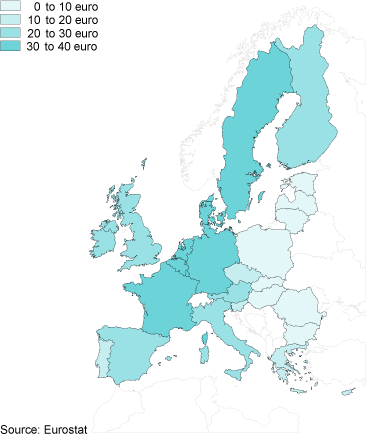Increase labour costs in the Netherlands equals EU average

Labour costs in the Dutch private sector have risen at the same rate over the past decade as the average across the entire European Union. Between 2001 and 2011 Dutch labour costs per hour worked in industry and commercial services have increased by 36 percent. Labour costs are an important factor which affects the international competitive position of the Netherlands.
Increase labour costs per hour worked (local currency) between 2001 and 2011

Labour costs increase considerably lower in Germany
The lowest labour costs increase was recorded in the German private sector. The wage restraint prevented the labour costs per hour worked from exceeding 19 percent. Europe’s largest economy occupies a unique position in this respect. The labour costs in France and Spain, for example, rose by 39 and 47 percent respectively. In the United Kingdom, labour costs (expressed in British pounds) rose by 42 percent.
Labour costs increase substantially higher in Central and Eastern Europe
The labour costs increase was considerably higher in Central and East European countries. Labour costs per hour worked have doubled over the past decade in Hungary and the increase was even more dramatic in the Baltic states, Bulgaria and Romania.
Labour costs highest in Belgium
Belgium has the highest labour costs of all countries in the European Union. The labour costs per hour worked amounted to 39.3 euro in 2011. Labour costs also exceeded 30 euro per hour in Sweden, Denmark, France, Luxembourg, the Netherlands and Germany. With 31.1 euro per hour worked, the Netherlands takes up sixth place, just above Germany where the average labour costs per hour worked amounted to 30.1 euro.
Labour costs per hour worked, 2011

Differences within the EU level off
The average labour costs level in the European Union was 23.1 euro per hour worked versus less than 10 euro in the Central and East European countries. In Bulgaria, labour costs were as low as 3.5 euro per hour worked. These countries had the lowest labour costs, but also faced the most substantial increase between 2001 and 2011. As a result, the gaps within the EU have narrowed over the past ten years.
Han van den Berg and Mark Zuiderwijk
Source: Eurostat,